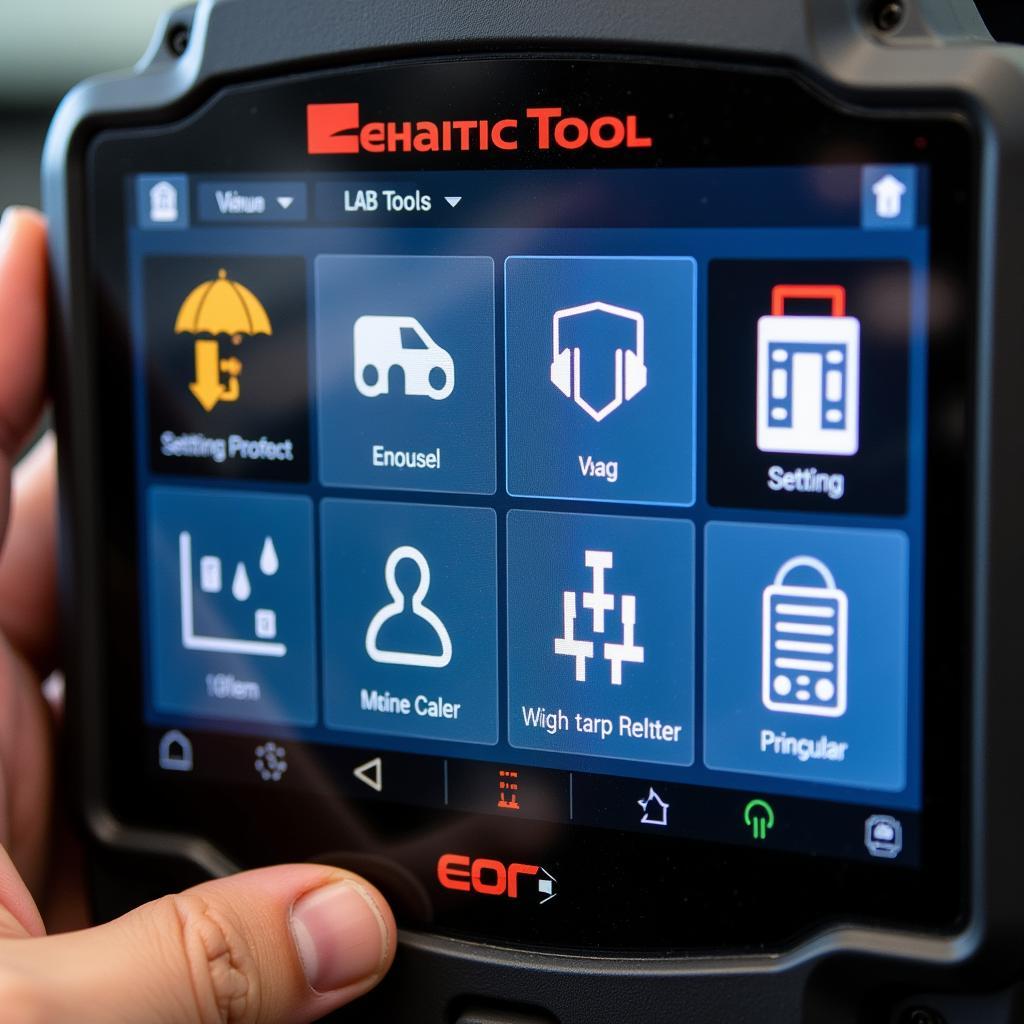Hdd Diagnostic Utility Tools are essential for anyone working with modern vehicles, whether you’re a professional mechanic or a DIY enthusiast. These powerful tools allow you to delve into the depths of a vehicle’s hard drive, diagnosing and potentially resolving issues that impact performance, functionality, and even safety.
Why HDD Diagnostics Matter in Automotive Repair
Automotive systems are increasingly reliant on complex electronic control units (ECUs) that store critical information on hard disk drives (HDDs). These HDDs house everything from navigation data and entertainment settings to engine control parameters and safety system configurations.
When an HDD malfunctions, the symptoms can be varied and perplexing:
- Infotainment System Glitches: Slow response times, freezing screens, or complete system crashes.
- Navigation Errors: Inaccurate mapping, routing problems, or loss of GPS signal.
- Vehicle Performance Issues: Unexplained warning lights, reduced engine power, or transmission malfunctions.
- Safety System Failures: Malfunctioning airbags, anti-lock brake systems (ABS), or electronic stability control (ESC).
Identifying the root cause of these problems often requires specialized HDD diagnostic utility tools.
Types of HDD Diagnostic Utility Tools
There’s a wide range of HDD diagnostic tools available, each offering unique capabilities:
1. Code Readers and Scanners:
These entry-level tools are a must-have for any mechanic or car owner. They connect to the vehicle’s OBD-II port and can read and clear diagnostic trouble codes (DTCs). While they may not directly diagnose HDD issues, they can reveal related problems with ECUs or communication networks that provide valuable clues.
2. Advanced Diagnostic Scanners:
Professional-grade scanners offer more in-depth diagnostic capabilities. They can access manufacturer-specific codes, perform bi-directional control tests (actuating components), and provide live data streams from various sensors and systems, including those related to the HDD.
3. HDD-Specific Diagnostic Tools:
These specialized tools are designed explicitly for working with automotive HDDs. They can perform tasks like:
- Data Recovery: Retrieve lost or corrupted data from damaged HDDs.
- Firmware Updates: Install the latest software updates for improved performance and compatibility.
- Error Checking and Repair: Scan the HDD for errors and attempt repairs.
- Drive Cloning: Create exact copies of HDDs for backup or replacement purposes.
[image-1|hdd-diagnostic-tool|Automotive HDD Diagnostic Tool|A mechanic using a specialized diagnostic tool to connect to a vehicle’s hard drive, accessing and analyzing data to diagnose and resolve issues.]
Choosing the Right HDD Diagnostic Utility Tool
Selecting the appropriate tool depends on your specific needs and expertise:
- DIY Enthusiasts: A basic code reader or scanner with live data capabilities might be sufficient for checking for common issues.
- Mobile Mechanics and Small Workshops: An advanced diagnostic scanner offering manufacturer-specific codes and bi-directional control is a versatile choice.
- Specialized Repair Shops and Dealerships: Investing in HDD-specific diagnostic tools and software is essential for comprehensive diagnosis and repair of complex HDD problems.
Benefits of Using HDD Diagnostic Utility Tools
- Accurate Diagnosis: Pinpoint the root cause of HDD-related issues instead of relying on guesswork.
- Time Savings: Quickly identify problems and avoid spending hours on unnecessary troubleshooting.
- Cost-Effectiveness: Prevent costly repairs by addressing HDD issues early on or recovering valuable data.
- Improved Vehicle Performance: Restore optimal functionality and performance by resolving HDD-related glitches.
- Enhanced Safety: Ensure the proper operation of critical safety systems that rely on HDD data.
Tips for Using HDD Diagnostic Utility Tools Effectively
- Consult Vehicle-Specific Information: Refer to the vehicle’s service manual for specific instructions and precautions.
- Use Reputable Software and Tools: Opt for well-known brands and regularly update software to access the latest features and compatibility.
- Back Up Important Data: Before attempting any repairs, create a backup of the HDD’s data to avoid potential loss.
- Proceed with Caution: Modifying HDD data or settings incorrectly can have serious consequences. If you’re unsure about a procedure, consult with an experienced technician.
Conclusion: Unlocking Automotive Potential
HDD diagnostic utility tools are no longer optional equipment for automotive professionals and enthusiasts. They are crucial for unraveling the complexities of modern vehicles and ensuring optimal performance, safety, and reliability. By investing in the right tools and knowledge, you can unlock the full potential of automotive diagnostics and keep vehicles running smoothly.
For expert guidance and a wide selection of top-quality HDD diagnostic tools, contact ScanToolUS at +1 (641) 206-8880 or visit our office at 1615 S Laramie Ave, Cicero, IL 60804, USA.
Frequently Asked Questions:
- Can I use any HDD diagnostic tool on any car?
- Not necessarily. Compatibility varies depending on the vehicle’s make, model, and year.
- Is it safe to update HDD firmware myself?
- While possible, it’s recommended to have a professional handle firmware updates to avoid potential complications.
- Can I recover data from a physically damaged HDD?
- Data recovery from physically damaged drives is a specialized task and may require professional services.
- How often should I use HDD diagnostic tools?
- Periodic checks, especially when experiencing unusual vehicle behavior, can be beneficial.
- What are some common signs of a failing HDD in a car?
- Symptoms like infotainment system glitches, navigation errors, or unexplained warning lights could indicate HDD problems.




Pingback: Unlocking the Power of HD Vehicle Diagnostic Scan Tools: A Comprehensive Guide - Car Scan Tool